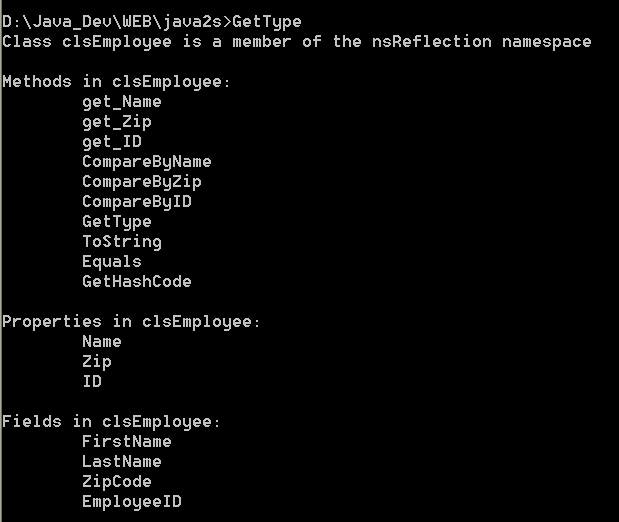Demonstrate using Type class to discover information about a class

/*
C# Programming Tips & Techniques
by Charles Wright, Kris Jamsa
Publisher: Osborne/McGraw-Hill (December 28, 2001)
ISBN: 0072193794
*/
// GetType.cs -- Demonstrate using Type class to discover
// information about a class
//
// Compile this program with the following command line:
// C:>csc GetType.cs
using System;
using System.Reflection;
namespace nsReflection
{
class clsEmployee
{
public clsEmployee (string First, string Last, string Zip, int ID)
{
FirstName = First;
LastName = Last;
EmployeeID = ID;
ZipCode = Zip;
}
public string FirstName;
public string LastName;
public string ZipCode;
public int EmployeeID;
public string Name
{
get {return (FirstName + " " + LastName);}
}
public string Zip
{
get {return (ZipCode);}
}
public int ID
{
get {return (EmployeeID);}
}
static public int CompareByName (object o1, object o2)
{
clsEmployee emp1 = (clsEmployee) o1;
clsEmployee emp2 = (clsEmployee) o2;
return (String.Compare (emp1.LastName, emp2.LastName));
}
static public int CompareByZip (object o1, object o2)
{
clsEmployee emp1 = (clsEmployee) o1;
clsEmployee emp2 = (clsEmployee) o2;
return (String.Compare (emp1.ZipCode, emp2.ZipCode));
}
static public int CompareByID (object o1, object o2)
{
clsEmployee emp1 = (clsEmployee) o1;
clsEmployee emp2 = (clsEmployee) o2;
return (emp1.EmployeeID - emp2.EmployeeID);
}
}
public class GetType
{
static public void Main ()
{
Type t = typeof(clsEmployee);
if (t == null)
{
Console.WriteLine ("t is null");
return;
}
Console.WriteLine ("Class clsEmployee is a member of the {0} namespace", t.Namespace);
Console.WriteLine ("\r\nMethods in clsEmployee:");
MethodInfo [] methods = t.GetMethods ();
foreach (MethodInfo m in methods)
Console.WriteLine ("\t" + m.Name);
Console.WriteLine ("\r\nProperties in clsEmployee:");
PropertyInfo [] props = t.GetProperties ();
foreach (PropertyInfo p in props)
Console.WriteLine ("\t" + p.Name);
Console.WriteLine ("\r\nFields in clsEmployee:");
FieldInfo [] fields = t.GetFields ();
foreach (FieldInfo f in fields)
Console.WriteLine ("\t" + f.Name);
}
}
}
Related examples in the same category